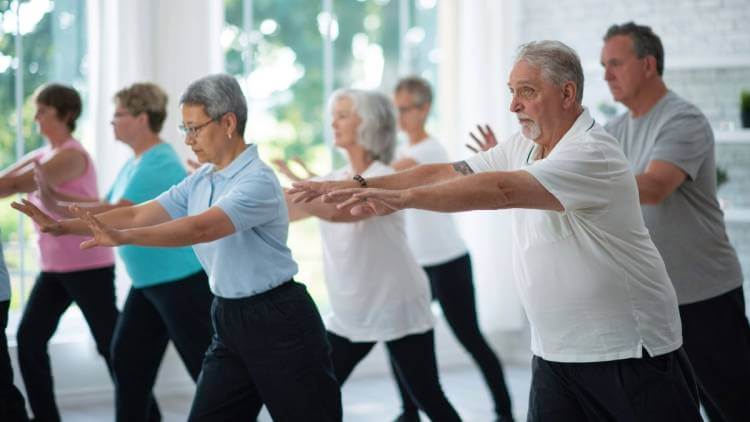Finding productive and enjoyable indoor activities for seniors can be a big help as it is difficult for some older adults to enjoy the outdoors. Fear of adequate mobility may be the main reason. It’s a very circular situation, because the less a senior moves around, the more difficult mobility will become.
A study at the Finnish Centre for Interdisciplinary Gerontology at the University of Jyvaskyla confirmed that the fear of falling while outdoors increased physical problems for the elderly who are hesitant to leave their home. This fear can threaten a senior’s ability to live independently and participate in social activities. It can be very isolating.
One of the researchers, Merja Rantakokko, stated, “People afraid of moving outdoors should be recognized early, and suitable support activities should be created for them, thus preventing further disabilities.” This is where caretakers become invaluable.
The study used 314 seniors between the ages of 75 to 81 in a three-and-a-half-year study and their mobility was checked at six-month intervals. It confirmed that the mere fear of moving and falling increased the risk of actually falling among seniors.
It had also been found that seniors with mobility issues who walk slower are at a greater risk for developing dementia – the body and the mind are invariably linked. It seems that when the body slows down, so can the mind.
Mobility is critical for seniors on many levels, and if they are unable to go outside, it can help to keep them active and moving while indoors.
What Do the Elderly Do All Day?
When people work, their days are automatically filled with activities at least five days each week. After retirement, what used to be active time is turned into leisure time. Leisure time sounds like a great idea for seniors who remain active. But not all seniors do. With the help of caretakers, many seniors between the ages of 65 and 75 do spend a good part of their day on leisure activities.
Most of these activities include:
- Seniors watch a lot of TV during their free time, more than one hour than the average person. According to Geoffrey Godbey, professor emeritus at Pennsylvania State University, “The population is aging and older people watch more TV. TV viewing has generally been about half of all free-time use in the U.S. TV is immediate, it is comparatively cheap on a per-hour basis, and you can do it in half an hour.” And it can give seniors something on which to focus. If a senior and his or her caretaker watch a show together, they can enjoy a discussion following the show.
- Seniors work at home improvement. Now that they have the time, many retirees increase their work around the home, from cooking, gardening, and other household activities. This is work that people with jobs usually avoid due to lack of time.
- Seniors make dining an event. They usually do not have a place to run to. Instead, they linger over their meals, which they have spent time preparing. The average senior spends around an hour and a half eating. If a caregiver provides company, this can turn into an important social moment for the senior.
- With time on their hand, shopping and evaluating merchandise for quality and price, can take up some time. There is no longer any need to grab just anything at the market for dinner, so seniors can take their time and check for the best bargains.
- Seniors over the age of 75 spend an hour reading every day. This compares with 20 minutes a day the rest of the population spends with a book. If there is a caretaker, he or she can initiate a discussion about the book and prolong the pleasure.
- Retired people have more time to chat – whether it is with the doorman or the checker at the market. They may spend an hour a day being social.
- Seniors have the time to volunteer. According to Geoffrey Godbey, many hospitals, civic organizations, and libraries would find it near impossible to function without their over-65 volunteer staff. “A lot of the institutions of government and of charities are served by older people doing volunteer work.”
- Retirees have more time to relax and just reflect on life.
Most of the above activities take place indoors, but they play an important role in keeping seniors alert both mentally and physically. In a study at the Center For Vital Longevity at the University of Texas, 300 people participated in a research project which determined that when adults older than 50 years kept busy, they processed information better, their memory improved, and they had better reasoning power and a larger vocabulary.
While keeping to a schedule may increase stress, Denise Park, director of the project, stated, “We certainly considered that being very busy could hurt cognition. Basically, the data suggest that the benefits of busyness outweigh the downside.”
How Do You Keep an Elderly Person Entertained?
Caregivers and family may frequently struggle with creating enough activities for an elderly person. It is not very difficult and can be accomplished by the entire family.
Seniors are actually easy to entertain, it’s just that they may not have the same types of interests that younger generations have. This is why younger people struggle with “What should we do with grandma?” or what have you.
You can keep seniors entertained through board games, ability-appropriate physical activities, and anything that involves talking about the past.
Younger seniors may appreciate playing AARP online games, but many older adults are not interested in playing games with a remote control or their phone. Board games are a much better alternative as they’re more active, they’re more “real,” and they better facilitate conversation and engagement with others.
We’ve discussed the importance of physical movement for seniors many times. It cannot be understated. “Use it or lose it” rings true. If you can successfully keep a senior entertained in an activity that involves physical movement, you’ll be improving both their mental and physical well-being.
Ask any older adult about what life was like when they were growing up, how they met their spouse, and old friends and family members and they’re apt to talk your ear off. They love to pass on memories and re-live the past. Ask them to help you assemble a family tree and you’ll have their attention for as long as it takes. Ask them if they have old pictures.
5 Indoor Activities for Seniors
Caregivers need to suggest a variety of interesting indoor activities for seniors, especially during the winter months, when cold and slippery conditions make going outdoors a hazard to be avoided.
1 – Tai Chi
Tai chi is a traditional form of Chinese healthcare and has been accepted in the West as promoting mind and body fitness. Tai chi helps seniors improve their balance, immune system, and cognitive abilities. This type of light but effective excise is especially popular because it is easy to do.
According to Peter Wayne, director of the Osher Center for Integrative Medicine:
We often talk about tai chi as mindfulness on wheels. It integrates slow, intentional movements with breathing and cognitive skills like imager. e start gradually, and because we’re mindful, because we’re not following the Western adage of ‘give it 110%,’ but instead it’s like ‘give it 60 to 70%,’ exercise feels more comfortable, safe and sustainable.
https://www.forbes.com/health/healthy-aging/tai-chi-for-seniors/
Even though tai chi movements are easy, they are always focused. This means seniors use balance, strength, agility, and stamina. It will also improve cognitive function and decrease stress while elevating the practitioner’s mood.
Caregivers can help their loved ones perform tai chi moves, and learn for themselves in the process! Having a person help guide the senior through the moves will help them learn, and it can be a bonding activity between the two.
2 – Games and Puzzles
Cognitive strength for seniors is an integral part of remaining independent. Games and puzzles can be very beneficial in keeping the mind strong and functioning well. They can also be fun.
Many seniors experience a loss of mental sharpness. The more they keep exercising the brain, the longer it will stay remain fit as the mind requires regular exercise just like the rest of the body.
Aging can be stressful, and puzzles can help alleviate some of that burden by shifting our focus from our health, finances, and other problems to something fun – at least temporarily.
Games are usually a group activity and provide seniors with needed socialization. Most retirement homes encourage games to help seniors bond. Within families, playing games can bring different generations closer. Games are excellent tools against loneliness.
Games and puzzles involve solving a problem. The more seniors enhance their problem-solving skills during games, the better these skills will translate to life in general as seniors become more able to handle everyday obstacles.
Word games improve seniors’ ability to focus and concentrate. Whether they are playing scrabble or solving the crossword puzzle, word games provide a daily brainpower boost.
3 – Arts and Crafts
There is a definite connection between the human brain and art. Art has always helped people explore their thoughts and emotions, and that becomes especially important as we age. While most everyone starts life with a coloring book and a box of crayons, and the joy that accompanies that, simple creativity frequently gets lost in the “real” world. Caregivers can help seniors reclaim that lost passion.
A study at the University of British Columbia School of Nursing published in the Journal on Active Aging involved four different community centers in Vancouver. The results found that seniors who participated in professional art programs had stronger social connections, were able to cope more easily with stress, and suffered from reduced chronic pain. Their morale improved, and there were fewer falls.
These seniors participated in a variety of activities, such as photography, dance, painting, singing, and writing. Not only did they experience health benefits, but they became more confident when learning and mastering something new and felt happy to be able to express their creative ability.
There is no need to become a master artist. Not everyone is a Rembrandt. Whether it is painting or pottery, it is the act of being creative that can improve seniors’ mindset and add to their wellbeing.
4 – Cooking and Baking
Cooking has a happy association for almost everyone. We all enjoy eating, and holidays invariably involve plenty of delectable food, friends, and family. Many have memories of a grandparent spending days preparing a special meal and desserts, or of the very first holiday meal we prepared ourselves.
There are some remarkable psychological benefits for seniors to continue – or begin – to cook.
- Planning Meals
Cooking requires some planning as we deal with ingredients and how to put them together to create a meal. This requires a focus that will benefit seniors.
Seniors can create a shopping list and visit the local market, which provides an opportunity to leave home. Once at the market, any number of decisions (which meat, what types of vegetables, they are out of parmesan, what replacement do I use, etc.) will become necessary.
This helps seniors remain independent and fight off the onset of dementia as they must make decisions on their own. If seniors are not able to do this alone, they can be accompanied by a caregiver for support. The meal doesn’t need to impress Julia Child; it only needs to be fun to plan and prepare.
- Cooking and Socializing
Planning a meal is virtually impossible without dealing with other people, i.e., socializing. You ask the baker about the freshness of the bread, you check with a store employee about the location of the baking material, and you chat with the checker.
In addition, once those batches of cookies are baked and cooled, the cook is likely to visit a neighbor or two to offer some. Nothing says social like food.
- Nutrition
Seniors can be lax with it comes to healthy eating. Sometimes, a burger at MacDonald’s is the easiest way to go. When seniors prepare their own meals, however, they control the ingredients and the nutrients. The body will surely be grateful.
5 – Yoga
The benefits of yoga for seniors are quite similar to those of tai chi as they both involve light and focused movements of the body. This may be too physical for some seniors, but even simple chair yoga can benefit seniors, and the moves are friendly to those with mobility issues.
Much like Tai Chi, this activity isn’t going to appeal to all seniors, but if you can get them to do it, the benefits are immense.
The Importance of Creating a Routine
Are you, or is your loved one, bored most days of the week? Establishing a daily routine that involves scheduled, predictable activities could be the answer to staying entertained.
A daily routine allows seniors to remain in control of their lives and live with greater independence. A routine provides structure, while the lack of one can add stress to a senior’s day. A routine makes the day easier because there is no need to think about what to do next, which, conversely, makes the caretaker’s job easier.
With a routine, seniors can more easily remember when to take their medication, eat, remain hydrated, and go to the bathroom. Of course, the routine should remain flexible. When a senior has a grandchild visiting, it’s perfectly okay to skip the dusting for the day.
Benefits of a daily routine:
- A routine allows seniors to not worry about every aspect of their lives. They know when to shop, eat, bank, etc., and how to perform those functions. This greatly reduced stress and anxiety as it put seniors in control without being overly dependent on someone else. This is especially important when seniors are suffering from the onset of dementia or Alzheimer’s. They will function a great deal more efficiently when their activities are structured.
- A routine limits the unexpected and uncertainty in a senior’s life. With routine comes a feeling of security and safety.
- The diminution of daily stress allows seniors to sleep better. Sleep is critical in keeping the immune system healthy and reducing the risk of heart disease, diabetes, and obesity.
Summary
Caretakers need to ensure that their seniors are kept as mentally and physically active as possible. The brain is a muscle that needs exercise as much, if not more, than the body. Helping with age-appropriate activities will make the caretaker’s job easier and keep the senior challenged and upbeat.
Need more ideas? Consider our other article on activities for seniors, which is not restricted to indoor activities.
Have ideas we didn’t think of? Let us know in the comments section.







